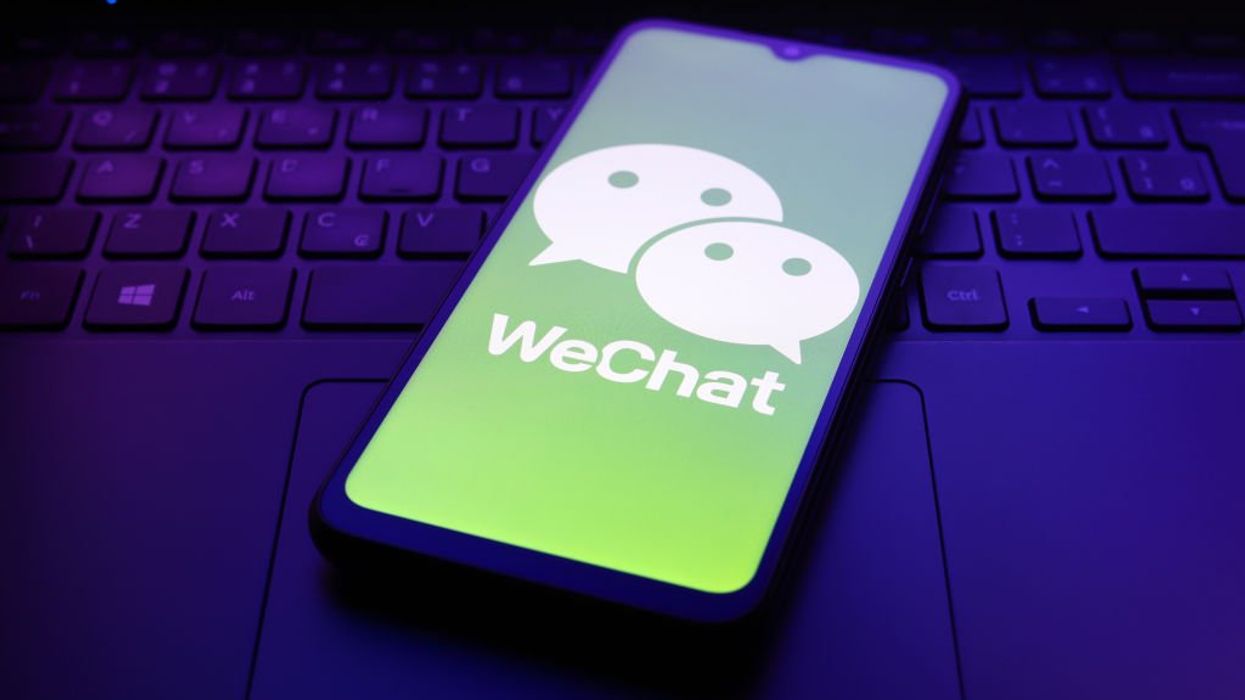
Jaque Silva/NurPhoto via Getty Images

For years, the U.S. has debated whether TikTok poses a serious threat to privacy, democracy, and national security. This scrutiny is well founded — its vulnerabilities and potential for misuse are undeniable. But while TikTok dominates the conversation, a far more insidious platform has quietly evaded the spotlight.
With at least 4 million users in the U.S., WeChat's user base might pale in comparison to TikTok’s, but its potential for damage far outweighs its modest footprint. This is not just another social media app; it’s the backbone of China’s surveillance state.
Owned by Tencent, a tech giant with undeniable ties to the Chinese Communist Party — 23% of its employees are reportedly members — WeChat functions as an extension of Beijing’s ideological apparatus. For Chinese citizens, both within and beyond the country’s borders, WeChat is not merely a tool for communication. It’s a digital leash. The app monitors messages, scans locations, and censors content deemed “politically sensitive” by Beijing.
Through China’s national security laws, Tencent is obligated to hand over any data that the CCP demands. These laws apply to servers in Hong Kong, which, contrary to its pre-1997 promises, has become another arm of Beijing’s authoritarian machine. For Chinese diaspora members in the U.S., WeChat is a lifeline to family and friends back home (more on this in a minute). But this connection comes with a hidden risk.
Straying from the party line can result in an account ban, cutting users off from essential communication, payments, and services. The message is clear: Stay in line, or face isolation.
For the broader U.S. population, this surveillance tool may feel distant, but its implications are anything but. The app’s reach doesn’t stop with its users — it’s a Trojan horse capable of compromising any device it touches, spreading spyware like a virus to those who never even downloaded it.
Researchers have raised alarms about WeChat’s capacity to act as a conduit for spyware, enabling the CCP to gain access to sensitive information from infected devices. Imagine a corporate executive receiving a seemingly innocuous message from a colleague who uses WeChat. That single touchpoint could be enough to compromise the executive’s device, granting bad actors access to corporate emails, proprietary data, or even trade secrets.
The danger multiplies exponentially when applied to government officials, contractors, or anyone handling sensitive national security information. A phone compromised by WeChat spyware could become an unwitting surveillance device, allowing hostile actors to listen in on conversations, track movements, or even activate cameras remotely. The potential damage is not hypothetical — cybersecurity experts have documented similar tactics deployed by China in other cases.
Now consider the scale. With millions of WeChat users in the U.S., many of whom interact with non-users daily, the app becomes a digital contagion. Each compromised device acts as a vector, spreading the infection farther, infiltrating networks, and bypassing traditional security measures.The question isn’t whether these vulnerabilities will be exploited — it’s whether they already have. After all, the CCP has already stolen the personal data of tens of millions of Americans.
Beyond its technical threats, WeChat serves as a tool for censorship and propaganda, extending the CCP’s ideological reach onto American soil. By monitoring and controlling the content its users share, WeChat ensures that dissenting voices are silenced while amplifying pro-CCP narratives. For instance, posts critical of Beijing’s policies — whether related to human rights abuses in Xinjiang or military aggression in the South China Sea — are swiftly removed or shadow-banned.
Moreover, during U.S. elections, WeChat has been used as a tool for spreading CCP propaganda, such as disinformation campaigns targeting Chinese-speaking voters in states like California and Texas. False narratives, including claims that certain candidates supported anti-China policies or would harm the Chinese community, were disseminated to sway opinions and suppress opposition. In other words, China has weaponized this app to sow discord and manipulate democratic processes in America.
With all eyes on TikTok, WeChat, with its proven track record of facilitating censorship, spreading spyware, and enforcing ideological conformity, has flown largely under the radar. This double standard is not just shortsighted — it’s downright dangerous.
The United States has the capacity to address both threats simultaneously. Banning WeChat is not merely a matter of convenience; it’s a necessity for national security. Arguments against such action often center on the app’s aforementioned importance to the Chinese diaspora, who rely on it to stay connected with family and friends back home. But this reliance cannot outweigh the risks posed by its continued operation. It’s 2025, for crying out loud. There are numerous alternative communication platforms that offer secure, private channels for connection without the baggage of CCP surveillance.
Allowing WeChat to remain operational in the U.S. undermines both security and sovereignty. It gives the CCP a foothold in the digital lives of millions of Americans, creating vulnerabilities that can be exploited at any moment. If the U.S. is serious about countering China’s growing influence, banning WeChat must be part of the strategy.
John Mac Ghlionn
Contributor